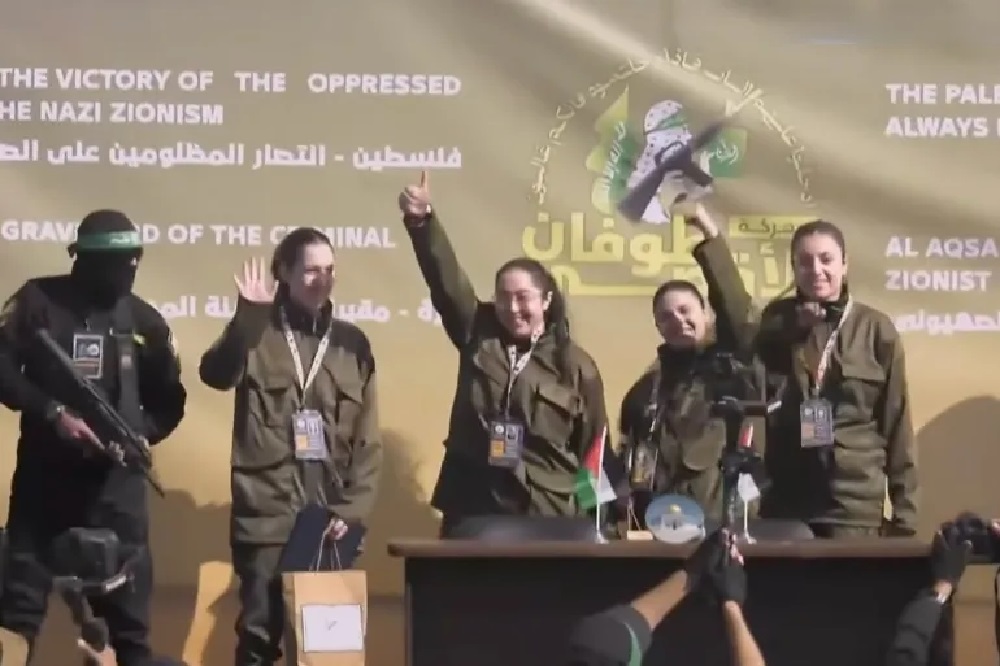Watan-The Islamic Resistance Movement (Hamas) accused Israel of “procrastinating” in implementing the terms of the ceasefire agreement by preventing displaced Palestinians from returning to northern Gaza, warning that such delays could have repercussions on subsequent stages of the agreement.
In a statement, Hamas said, “The occupation is still procrastinating in implementing the terms of the ceasefire and prisoner exchange agreement by continuing to block Al-Rashid Street and preventing displaced pedestrians from returning from the south to the north.”
The movement added, “We hold the occupation fully responsible for any delay in implementing the agreement and its consequences for the remaining stages.”
Earlier on Saturday, Israeli Prime Minister Benjamin Netanyahu justified not releasing a civilian detainee named Orbel Yehud among the female soldiers Hamas had freed, saying that Tel Aviv would not allow Palestinians to cross into northern Gaza until this step was addressed.
According to the agreement, Israel was supposed to open Salah al-Din Road—which connects all parts of Gaza from north to south—for Palestinians as soon as it received the second group of its prisoners, according to Maariv newspaper.
Meanwhile, Israel Hayom quoted unnamed Israeli sources as saying that Israel had requested mediators to press for the release of Orbel Yehud before next Saturday in a separate operation.
The sources added, “If she is released, the return of Gaza residents to northern Gaza will begin before Saturday.”
After the release of the four female detainees, Israeli army spokesperson Daniel Hagari said during a press conference broadcast by the army on the platform X: “Hamas did not adhere to the agreement regarding its commitment to release the civilian women first,” as he claimed.
He added, “We will insist on the return of Orbel Yehud, as well as Shiri and the Bibas family members, about whom we are deeply concerned, as soon as possible.”
In a related context, Israel’s Channel 13 quoted an unnamed security source as saying that Israel would not allow Palestinians to move north until it obtained evidence proving that detainee Orbel Yehud is alive.
According to Channel 12, Hamas was supposed to release three female soldiers and one civilian detainee—Orbel Yehud—as part of the second batch in the first phase of the ceasefire deal. However, it released four female soldiers instead.
Second Exchange Round
Earlier on Saturday, the Israeli army announced in a statement the arrival of four female soldiers released by Hamas to Israel.
For each Israeli soldier exchanged, 50 Palestinian detainees are released, including 30 sentenced to life imprisonment and 20 with high sentences, according to a Hamas source speaking to Anadolu Agency on Saturday.
In total, Israel currently holds more than 10,300 Palestinian detainees in its prisons, while approximately 96 Israeli detainees are estimated to be held in Gaza.
The Gaza ceasefire agreement—which went into effect on January 19, 2025—included a prisoner exchange deal to release Israeli detainees in Gaza in exchange for Palestinian detainees held in Israeli prisons.
In the first phase of the agreement—comprising three phases, each lasting 42 days—the terms stipulate the gradual release of 33 Israeli detainees held in Gaza, whether alive or as bodies, in exchange for approximately 1,700–2,000 Palestinian detainees.
The first exchange, conducted on the initial days of the agreement, saw the release of three Israeli civilian detainees in exchange for 90 Palestinian detainees, including children and female detainees, all from the occupied West Bank, including Jerusalem.
With full U.S. support, Israel committed genocide in Gaza between October 7, 2023, and January 19, 2025, resulting in over 158,000 Palestinian martyrs and wounded—most of them children and women—and more than 14,000 missing individuals, marking one of the worst humanitarian catastrophes in the world.
